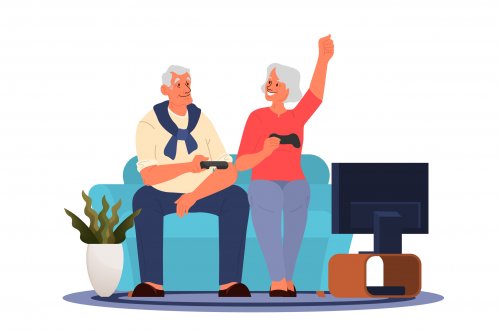Defined as “Digital technologies for older people and healthy ageing”, the WTISD-2022 forum brought together Dr. Zsuzsanna Jakab, Deputy Director-General, World Health Organization (WHO); Mr. Houlin Zhao, Secretary-GeneraI, International Telecommunication Union (ITU); Dr. Jane Barratt, Secretary-General, International Federation on Ageing (IFA); H.E. Ms. Ursula Owusu-Ekuful, Minister, Ministry of Communication and Digitalization, Ghana. Intersputnik, being a gold ITU member, joined its telecom colleagues at this celebration event online.
In his welcome address to the panellists, United Nations Secretary-General António Guterres, pointed out that “On this World Telecommunication and Information Society Day, the focus is on digital technologies for older people and healthy ageing. From building smarter cities to combatting age-based discrimination at the workplace, ensuring financial inclusion, safeguarding independence, and supporting millions of caregivers across the world — information technology has vast potential to improve the lives of older people and their families and communities.
World population getting older
The subject in question has become a burning issue not least because the growing average age results in a higher proportion of the elderly gradually increasing. At the same time, global equality and sustainability are unimaginable without their keen involvement in social and economic activities. As of today, there are about 1 billion people aged 60+ in the world. Suffice it to say, this figure has more than doubled since the break of the century, and is expected to reach 2 billion by 2050.
At the same time, experts note that urbanization, which changes the traditional social structure, creates additional barriers to the involvement of older people in social and economic life. The digital divide between generations is growing wider.
Digital technologies as a counter-pandemic remedy
The COVID-19 pandemic has spotlighted the vital importance of digital technologies for the elderly. Throughout the lockdown period and stay-at-home restrictions, the ICTs became a real lifeline for most of the seniors, saving them from social isolation, loneliness and depression, and solving household issues like order and delivery of foodstuffs, medicines, and bare essentials. And the last but not least, healthcare: oddly enough, it was the pandemic that allowed the ITU and WHO to approve for the telemedicine services standards. For instance, in the United States, the use of telehealth options increased by 38 times from before the pandemic, the number of webinars and online medical courses in 2020 increased by 300-350 times compared to 2019.
Since then, health and care apps have enjoyed success like never before: ones reminding the elderly to see a doctor, or receive treatments; others uploading test results to the apps so that relatives and doctors can track health markers; some renewing the prescriptions etc.
ICTs as a driving force for healthy ageing
Over the last decade, ICTs have become the game-changing and even a life-saving factor. That is why ICTs are often seen as a driving force for healthy ageing. At the moment, international institutions report that UN Sustainable Development Goals targeted at healthcare have made a progress of as little as 25% of what is planned to be done by 2030. ICTs are intended to streamline this process. Besides, what the pandemic revealed was not limited to the significance of communications: we found out that no country was capable to rise to such challenges, which urges us to take swift actions to improve the situation.
Another factor not to be missed: ICTs offer an opportunity to collect helpful data for further analysis using age-based criteria. This, in turn, will help to elaborate well-balanced social policies, in particular, patient-oriented and personalized approaches when rendering health and caregiving services.
Total outreach as a prerequisite
Certainly, it is inclusive, i.e. generally available access to ICTs that underlies economic and social involvement of the elderly. At present, about half of the planet’s population are deprived of reliable Internet access, with the age barrier being one of enablers of the digital divide.
Apart from purely technical issues, the elderly have to be trained to use apps to their best advantage. This requires apps to be adapted to their needs and abilities. Otherwise, failure to master software products brings about estrangement, often further exacerbated by the negative response from the younger people who are by far more tech-savvy. Such trends should be got rid of as counterproductive.
These issues became evident during COVID-19 vaccination campaigns in countries with poorly developed IT infrastructure: the proportion of older Internet users in India is 4%, in Cambodia, Indonesia, Pakistan, Thailand – less than 10%. Even in such a technologically advanced nation as Singapore, the figure is about 50%.
Curiously, in terms of dollars and cents, investing into the ICTs for seniors is as rewarding as investing into the ICTs for the youth and middle-aged users. The wider seniors are included, the better is their involvement, and the higher is their contribution to social and economic activities.
Important message to the world community
To summarize the forum, Houlin Zhao, ITU Secretary-General, concluded: “Today, let us send a strong signal about the huge contribution our older persons can make in today’s digital society and economy. We can do this by investing in three key areas mentioned in our WTISD high-level panel: applicability, affordability and equitable access. Together, we can mobilize resources to help older people feel safe when they go online and increase their digital skills to use digital applications. The discussion gave us a good understanding of the opportunities ICTs can bring in benefiting older people everywhere”.
WTISD: a remarkable day for the whole ICT industry
Intersputnik shares the values and significance of the World Telecommunication and Information Society Day for the international community. The Organization has sent congratulations to its partners and colleagues across the globe, including ITU. “Telecommunications play a key role in all spheres of our life helping address the needs of society as a whole, as well as of certain population groups. ITU is helping to improve the quality of life for older people and to reduce the information and technological inequalities between generations, thus contributing most significantly to the achievement of the Sustainable Development Goals proclaimed by the UN” — Ksenia Drozdova, Director General of Intersputnik, stated in her message.
In his response letter, Houlin Zhao, ITU Secretary-General, stressed that “Every 17th May, WTISD helps raise awareness of the possibilities that the use of the Internet and information and communication technologies (ICTs) can bring to societies and economies everywhere, as well as ways to bridge the digital divide”.
Long-term goal to set for 2023: empowering the least developed countries
In 2023, the World Telecommunication and Information Society Day will be pivoted around “Empowering the least developed countries through information and communication technologies”. Suggested by India, this subject has been approved by the ITU Council. Indeed, a few of the Member States of Intersputnik belong to the LDCs. With this in mind, our Organization endorses and upholds this agenda as a blueprint for groundbreaking enhancements. Intersputnik looks forward and is determined to join the industrial community in making arrangements for upcoming WTISD-2023 celebration.
***
 Operations Committee
Operations Committee
